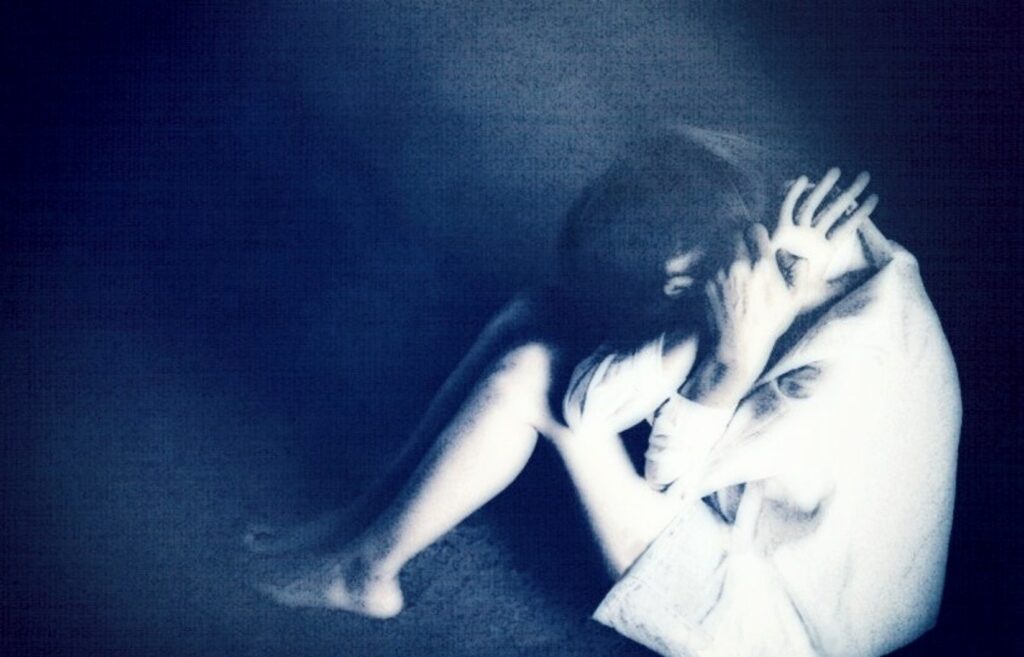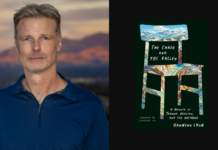The tale contained in this piece took place amidst an entire summer of mayhem. I was later told it was a ‘dysphoric mania’. As bad as I was in the weeks leading up to the events of that July night, it was nothing in comparison to the utter despair and pandemonium that followed.
Restraint: (noun) a measure or condition that keeps someone or something under control.
I was first trained in restraint in 2004 when I began working in services, which might require such an intervention to prevent serious harm to the self or another. I rarely had to use the physical aspect of the training, and for this I am very grateful. It is not something I ever took lightly and I clearly recall my huge upset following such events; when things were so unsafe that I had to put hands on somebody for safety reasons. I recall also the efforts made in the hours and days afterward to check in with the person to assure, mind, repair relationships, and re-establish emotional safety. I never expected to be restrained myself.

When one enters the psychiatric hospital it seems all bets are off and previous life norms cease to exist. It feels quite bizarre to ‘switch sides’ so to speak and to find oneself suddenly subjected to the different types of restraint that were previously theoretical or some form of an abstract concept. Environmental restraint sounds almost innocuous when read about. Realising you are locked in on a ‘voluntary’ basis is quite a different experience. I had times when it was almost a relief and times when I thought I might bulldoze through walls in order to get out.
Chemical restraint sounds a bit more threatening, but one might assume it to be a safe landing, softness, a nice hazy drugged state that allows for rest and recuperation. Assumptions are not always accurate however and choice is not always guaranteed. Voluntarily swallowing a tablet that promotes sleep is worlds apart from being forcibly injected with a substance to promote submissiveness.
And, finally, physical restraint, where movement is physically prevented, is to be used as a last resort, when things have become so unsafe that no other intervention is possible. Sounds reasonable perhaps, to get things back under control, however being held down by someone who seems to have lost control themselves is a different reality altogether.
Six years ago, during the summer of 2017, I found myself subjected to all three, simultaneously. Whatever level of hysteria had peaked prior to this ‘intervention’ was a mere taster of the distress and utter mayhem to follow in the aftermath of that night. Objective, non-emotional recall of the exact events of that night is difficult for myriad reasons. It was, perhaps, the most re-traumatising time of my life, at a time when I was in need of the most care and compassion.
I drove myself to the hospital. I was irate, suicidal, angry, upset, traumatised, and quite frankly, unhinged. I wrote previously of an attempt to come off medication earlier that year and it had been going relatively well until I stopped taking Seroquel quite abruptly. This fast withdrawal coincided with a situation through work that was reminiscent of my own early trauma from which I later developed long-standing cPTSD. I had entered some sort of a spiritual or healing crisis and I had not slept in what must have been a few weeks at that stage. I was delirious and somewhat delusional. I felt out of control, distressed and agitated beyond belief and I succumbed to the fact that I needed help and I needed it fast.
I remember sitting in my car in the driveway of my house before leaving for the hospital. I was going voluntarily. The clock read 11:11 and that seemed important and ‘proof’ that I was doing the right thing. The hospital is about a forty-minute drive away. I imagine I arrived before midnight.
I had phoned ahead before going in and spoke to a lady I was familiar with. She had some sort of senior nursing role in the hospital during the dark hours. I had been back and forth with the hospital in the weeks prior, as had others on my behalf. She gave me the go-ahead to come straight in and assured me I would be admitted and taken care of without delay. I was familiar with the hospital as I had been attending as an inpatient since 2009. Many there, in turn, were familiar with me. My ‘file’ was substantial after more than twenty admissions and my personality was such that I did not exactly ‘blend in’ despite my best efforts.
I imagine some hours had passed between the phone call and my arriving at the locked hospital gates. My chaotic mind struggled hugely with organisation and order at that time and packing for a hospital admission was challenging in the extreme. My car was packed to bursting with the most random items imaginable, squashed in, like I had to be ready for any and all situations. It mirrored my internal state. I pressed the buzzer at the gates. I remember the gates opened. I do not recall seeing anybody. I drove into the car park at the front of the hospital and waited a moment. I hoped someone would appear; anybody. The need for human connection of any sort was the strongest I ever remember it being. Nobody came. I tied something around my neck and made some futile attempt to attach it to the car door. It broke. I hit my head on the ground. Still nobody came. I lay there a while, semi-broken.
I heard shouting. It took a minute to realise that the shouting was being directed at me. Telling me to “stand up.” I obeyed and started dragging stuff out of the car. Nobody helped. I was told to go into the hospital. I obeyed. I remember looking at the backs of two people walking ahead of me as I walked in. I don’t remember much else. I was led to a locked unit, ‘Special Care’ and put into a room alone. It was quiet. I was told I needed to rest. I don’t know what I brought in with me but I had no sleepwear or underwear. My clothes were dirty. I was given a nightgown to get me through the night. I changed into it and nothing else. I don’t remember if I showered first.
I recall a brief feeling of relief washing over me. Finally I was safe. Finally there was connection, softness, care. Finally, I no longer had to fight alone. Or so I thought. Panic started to grip me and soon took hold completely. I tried to settle myself. I really tried. I was beyond exhausted. Tired and wired to the extreme. I don’t recall a doctor at that time. I don’t recall medication. I recall the nightgown, the bed, the four lonely walls, the silence and the closed doors. My brain started to scream. It got louder and louder and louder. My body began to shake. I felt trapped and terrified. And as my brain reached a crescendo, I felt like I might combust and explode all over those clean walls.
In that terror-stricken state I burst through the door and up to the nurses’ station. I was asked to be quiet. I was crying and wailing, distraught and terrified and my body was jerking in quite an uncontrollable manner. I asked to go outside. They said no. There is a small, contained, internal garden in that ward. In the weeks leading up to this time, the only thing that helped when I got to that state was to be outdoors, either barefoot on the ground, or sitting, or lying directly on it. It was as if there was an electrical charge running through my brain and body and the only way to begin to neutralise it was to earth it.
I asked again. They said no. After three times hearing no I stopped asking and started demanding. My language was not exactly ‘ladylike’; nor was my tone. The reactions back to me were not either. I got mad. They got mad. I got madder. I reached out and, with my hand, swiped a number of files clean off the desk and onto the floor. Papers went everywhere. They opened the door to the garden.
I recall the relief of the cooler night air, the smell of the grass and the city sounds slightly off in the distance. There were two nurses with me. I recall some kindness coming from someone dressed in blue, a nurse; she tried to help, like a solo flame of compassion. I would love to say I calmed completely. I didn’t, but the intensity began to reduce, like a ferociously boiling pot of water might reduce to a simmer should the flame beneath be reduced. I recall trying to light a cigarette from a borrowed lighter but struggling, as my body was still shaking and jerking quite a bit. It took many attempts. I am not sure how long I was out there; it could have been three minutes, it could have been fifteen. Time felt funny. I do know, however, that I broke some rule or expectation around time outside that I had not been made aware of.
I saw two more people walk towards me from inside. It was the female from the earlier phone call and a male. They ordered me in. I asked for more time to finish the cigarette. They ordered me in again, and when I did not immediately comply, I was lifted off my feet and carried inside. To say I boiled over would be an understatement. I do not recall ever being so scared and as though my entire nervous system had been electrocuted, I kicked and screamed and buckled as if to save my own life. Hands seemed to appear from nowhere and I was brought to ground.
All sense of time and space, right and wrong, dissolved into nothingness and I heard a primal scream erupt that seemed to last an eternity. It took some time to realise that it was coming from me. There were hands everywhere, it hurt, and I was face down on a cold hospital floor. I felt I couldn’t breathe but they said I was making too much noise not to be breathing. The holding intensified. I roared obscenities and it intensified further. I continued to try to kick and get away but it was futile. I felt the nightgown I was wearing, with nothing at all beneath, being pulled above waist level. There were hands everywhere; on my legs, my back, between my legs and still, the shouting to be still. My submissiveness came before the needle made contact. The shock and shame of such a violation silenced me. I lay there, face down, mostly naked, humiliated and shamed. I sobbed. I was truly broken now, and deserved all I got.
The next few days are a blur. I checked out of my body; I had to. And I bided my time. My ‘good behaviour’ allowed me to get moved next door to a more semi-locked ward. Instead of two or three locked heavy doors to get through, there was only one. I was so highly medicated I found it difficult to walk. I recall trying to roll cigarettes but constantly dropping everything. I ended up carrying around all of the cigarette paraphernalia in a little cardboard kidney dish to at least keep it all in one place. A friend visited during those days and I recall her referring to me as being like a baby deer learning to walk. My speech was slurred and I could barely move. After a couple of days in that half-locked ward and ‘playing the game’ I got permission to go to hospital bingo in the main part of the building. I walked into the main hospital, out the front door, got into my car and drove home, leaving all of my belongings behind me.
What followed is not the happy ending of escape and realisations but rather an amplification of every trauma symptom I had ever previously experienced, plus the addition of a resurfacing of all of the previously repressed traumatic memories. I was hyper-aroused, hyper-vigilant, paranoid and all types of so-called ‘delusional’. Like a feral, abused animal, I hissed and snapped at anyone who tried to come near me, regardless of their intentions. I became wilder and more reckless in the pursuit of my own demise but urgently wanted to ‘save all children’ from abuse and harm prior to my own exit. My intentions were noble but my methods were awry and I was a walking traumatised five-year-old, under attack, in a woman’s body wreaking havoc and upsetting the status quo wherever I turned. And there were many turns; and many tales yet to be told.
But for now — the restraint. ”First, do no harm.” I tried to complain. “Policy,” they said.















I’m glad you’ve found happiness and peace and I love your article – it’s so important – so very often people just want ‘the problem’ to go away and they are happy to use institutionalization, prisons, medicines, or other ‘treatments’ to ensure THEIR comfort. This is often done without giving any thought at all to the comfort of the very people they are purporting to help.
Thank you for your important story!
Report comment
Thank you Brian.
It can be felt too; when someone just wants you to go away. It causes further damage.
Report comment
Nicola, you are brave to share your truth around what happened to you in in-patient care. I deeply feel your humanity.
I’ve thought about these similar issues with in-patient care, as well as in my time working with disabled adults. The humiliation of restraints is immense. I know restraints are used often in oncology units and other parts of the hospital, when people take out their IVs.
I recently told an oncology nurse who is ordered to restrain people on the daily, that in 10-20 years we will look back on these practices as entirely cruel and inhumane.
Thank you for sharing what has happened to you, and thus advocating for shifts in this current approach to one another as humans in our states of distress.
Report comment
Thank you Tara
I hope you are correct in your view that we are hopefully on the cusp of change.
The level of desensitisation among practitioners is mind boggling. Hopefully stories like mine will allow people to see things from a more humane viewpoint.
Report comment
Hi Nicola,
Its sounds like a really frightening experience.
It’s very well known that lack of sleep can really screw a person up.
About half of all Seroquel prescriptions are for (off label) sleeping problems, for which it is very effective – and the exact opposite is true when someone tries to come off it.
Report comment
Thank you Fiachra.
It was absolutely terrifying. So terrifying in fact that it is only recently that I can bare to re-examine that time from a somewhat objective space.
And agreed about the sleep and lack thereof
Report comment
Nicola Clare, thanks for writing this piece. I know it well. You had me crying, from the horrors and injustices, and forced violation thrust on you ( and me) and so many stuck there in mental hospitals, or psych wards. We look forward to reading other of your stories. Eadward Kaitz, Maryland, USA
Report comment
Thank you Eadward
I’m sorry to hear you had to endure this too
Report comment
Hey. Thanks. Horrible, isn’t it? Knowing something’s wrong, trying to ask for help at the appropriate places and people, and get physically violated for it.
I’m terrified of being restrained. I had some very strange injuries(rug burn on my back?;?!) the first time I was committed when I was blacking in and out. I let them give me the shot; it was Haldol.
I’ve scars from the handcuffs the police used, I’ve scars on my soul from the injuries, and my mind turns to fury every time I hear of these incidents.
Has everyone forgotten to stop and explain, ask questions, be kind to others especially when mentally and emotionally flaky? Why do they start with knowing we’re that way and taking our pacifiers aka cigarettes away??
Why do they always use metal cuffs and why is it always men? I’m 5’1″; I’m the height I was at 12 years old! I spent most my life fighting to stay over 100 pounds.
I’m charged with Disorderly Conduct because I freaked and demanded a woman, leather restraints not cuffs, and where his body camera was at when I was told I had warrants in another State; my numbers but not me, and they knew it because she has tattoos.
When she got there he leaned toward me and said I was “playing that bipolar card pretty hard”.
Court is in February and the prosecutor told the judge he wasn’t going to press for jail time so I’ve no lawyer.
The scars on my wrist from 1996 he could lay his cuffs on and prove that’s what caused them. I’ve never been to that other State. I’m on SSDI, and I’m 51 years old.
They strip searched me and put me in a holding cell with a woman coming off meth and they were refusing to give her medicine to her correctly! I hate the particular medicine, but I had an allergic reaction, but I know it has to be taken twice a day. I heard the officers say that they could wait until 4:30-5:00 pm so everything would be closed. (They were wrong, since my Mom’s cousin that is a lawyer was still in his office when I walked from the jail; I wasn’t allowed a phone call).
I’m frightened of them all. I thought I’d gotten past it, but I was wrong. When he came out with cuffs, I put my hands up and my back to my car and said, “No man puts chains on me, no no, not chains! The leathers, is there a female, where’s your camera? No male, no chains, I’ve the Right!” (Which in Alabama I DO have). I didn’t try to run, or even get into my car, or anything like that. When the female got there, they got all over me about Meth. I don’t even drink or take anything with caffeine!
I’m on SSDI and an only parent to a teen daughter. No lawyer. It was $325 to get my car out, and it wasn’t even 5 miles or 24 hours. I can’t afford it. I made it this long without anything on my record, I’m 51!
No lawyer. No apology. No acknowledgement that it was a case of mistaken identity; they haven’t even told me what to do to straighten all this out!
They took my medication that was in the car. I was charged with it also but the judge threw it out when I gave my plea, since I took them a printout from my pharmacy.
Disorderly Conduct charge for being a scared and confused 51 year old, 5’1″ female who didn’t want a man to put chains on her. No lawyer.
I’m not scared. I’m furious. Because they’ll make me pay them money that my child and I need. Because they DON’T HAVE THE RIGHT TO CHAIN ME AND HURT ME AND RIDICULE ME!
Do they?
Report comment